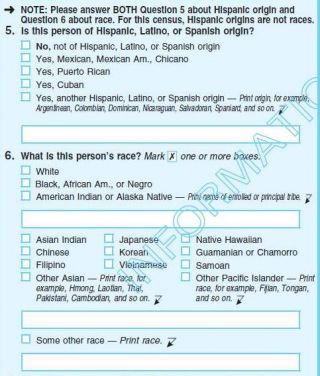Bias
Problems with the Census’ Racial Categories
Contradictions, injustices, and absurdities in the census’ racial categories
Posted September 3, 2013

2010 Census Race Questions
Kenneth Prewitt, a former director of the United States Census Bureau, recently wrote a New York Times op-ed, Fix the Census’ Archaic Racial Categories. In it, he makes a number of important points:
1. He mentions the sorry history of slavery, Jim Crow, and exploitation of colonized peoples, justified in part by the American racial hierarchy.
2. He explains the mismatch between unscientific census categories and the rapidly changing composition of the population of the United States.
3. He indicates how this mismatch prevents us from being able to understand the actual population dynamics taking place in the United States.
4. He points to the inappropriate and absurd choices faced by many individuals, especially immigrants and children of intermarriage, when trying to fill out the census questionnaire.
5. He makes a number of suggestions for improvement. Some of these—such as the suggestion to include a parental place of birth item, which provides important cultural information—strike me as excellent. Others, like creating a separate nationality question, do not. This is not the place for an extended discussion of the issue; but, briefly, the following is the way I see the situation.
“Race” and “nationality” are both cultural categories, with evolving and contested meanings. I would advocate simply making a single list of all the terms about which information is needed--items that might be considered under rubrics like “race,” “ethnicity,” or “nationality”--and asking each respondent to check as many as apply. Problems of whether certain minority groups would be undercounted by such a procedure can be handled by the way the data are analyzed.
***
Chapter 4 of my recent e-book and paperback, The Myth of Race, reviews and critiques the treatment of race in all 23 censuses, from 1790 to 2010. The following are some comments on and supplements to what Prewitt wrote. Those who are interested can consult my book for more details
1. Prewitt begins his piece by stating that, “Starting in 1790, and every 10 years since, the census has sorted the American population into distinct racial groups.” This assertion perpetuates the inaccurate statement on the 2010 census website that the question about race has been “asked since 1790.” In fact, the term “race” did not appear on the census until 1900, during the eugenics movement.
As discussed in detail in my book, the race concept differs widely from culture to culture; and it also changes substantially over time within a given culture. The huge variations in the census questions asked, and categories and sub-categories used for sorting, both reflect changes in Americans’ cultural beliefs about “race” and influence the future evolution of the concept in the United States.
2. A key problem is that the census implements American culture in confusing continuous biological variation around the planet (the human species has no biological races) with American folk categories. As a result, and following a desirable practice in the 1960 census, I would advocate removing the word “race” from the census. People can check the descriptors that refer to them without needing to characterize any of them as a “race.”
3. Most Americans would say that discrimination against Latinos is racial discrimination, but the census says that Latinos can be of any race. Hence, the census creates the hierarchical paradox that Latinos are a race that can be of any race.
Image source:
2010 Census Race Questions
http://commons.wikimedia.org/wiki/File:US_Census_2010_form_race.jpg
Check out my most recent book, The Myth of Race, which debunks common misconceptions, as well as my other books at http://amazon.com/Jefferson-M.-Fish/e/B001H6NFUI
The Myth of Race is available on Amazon http://amzn.to/10ykaRU and Barnes & Noble http://bit.ly/XPbB6E
Friend/Like me on Facebook: http://www.facebook.com/JeffersonFishAuthor
Follow me on Twitter: www.twitter.com/@jeffersonfish
Visit my website: www.jeffersonfish.com




